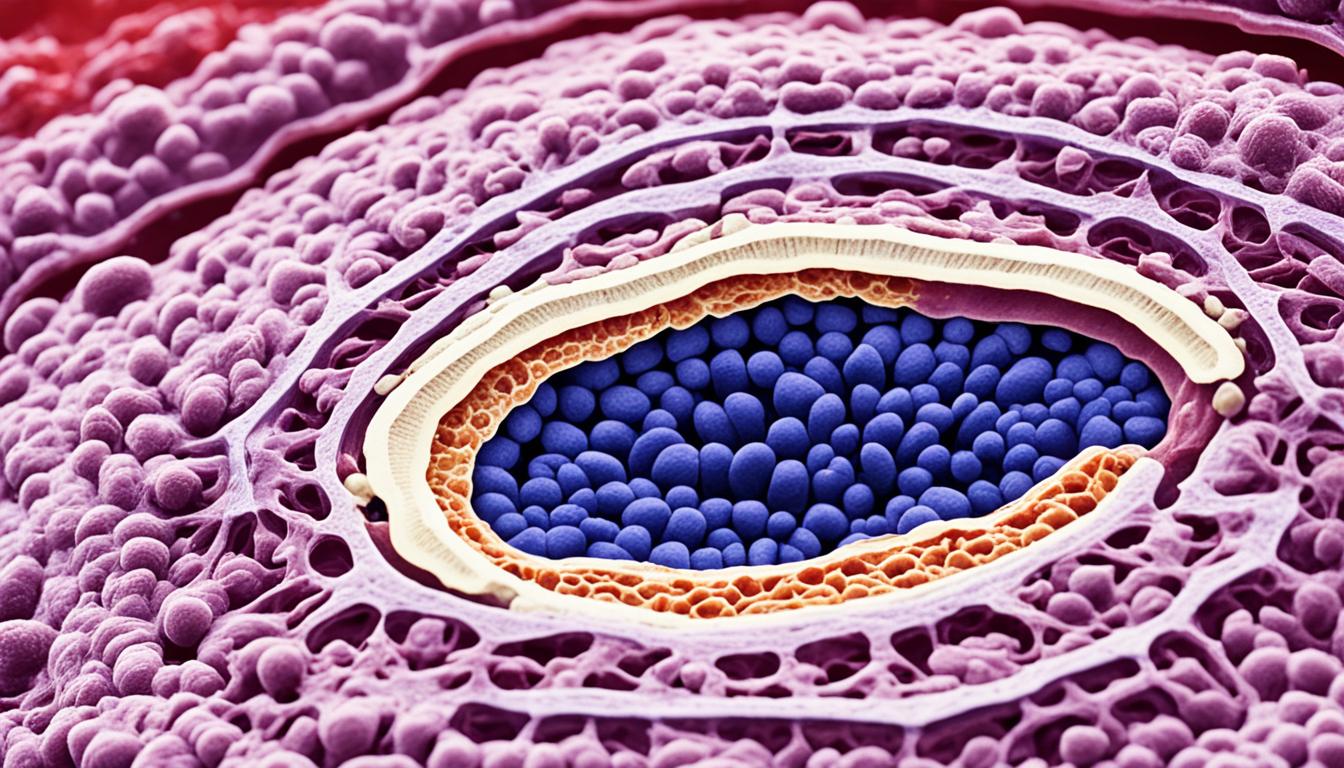Pancreatic cysts are like fluid-filled bubbles in the pancreas. They can be small or big and might not always show symptoms. Some of these cysts could lead to pancreatic cancer, making it important to know the signs, reasons, and how to diagnose them early.
Typical signs of cyst pancreatic disease are stomach ache, feeling sick, turning yellow, losing weight, and changing bathroom habits. But remember, you might not feel any of these and find out about them by chance during other exams.
Cysts in the pancreas can come from many reasons. These include things like long-term pancreas issues, false cysts, and even some genetic problems. Smoking, being overweight, and having a relative with pancreatic cancer might also raise your odds of getting cysts.
Finding out if you have a pancreatic cyst usually means looking at your health history, checking your body, and doing tests like ultrasounds and scans. These give the doctor a peek at the cyst’s size, where it is, and what it looks like. They help spot any risky signs, too.
Key Takeaways:
- Pancreatic cysts can be asymptomatic or may cause abdominal pain, nausea, and weight loss.
- Causes of pancreatic cysts include chronic pancreatitis, genetic disorders, and lifestyle factors.
- Diagnosis involves medical history evaluation, physical examination, and imaging tests.
- Surgical removal may be necessary for cysts larger than 3 cm or with suspicious features.
- Stem cell therapy shows promise as a regenerative treatment approach for pancreatic cysts.
Understanding cyst pancreatic disease is vital for both patients and doctors. Working together, they can find the best ways to treat and care for the condition.
Understanding Pancreatitis – Symptoms, Types, and Causes
Pancreatitis is when the pancreas is inflamed. It may show up suddenly (acute) or over time (chronic). Acute pancreatitis brings intense pain in the upper belly. Chronic pancreatitis causes ongoing pain and issues with digestion.
Causes of pancreatitis include gallstones, too much alcohol, some drugs, infections, injuries, and more.
Diagnosis starts with a physical check-up. Then, doctors do blood tests and use ultrasound or a CT scan to see the pancreas.
Symptoms of Pancreatitis
If someone has pancreatitis, they might feel:
- Severe upper abdominal pain
- Nausea and vomiting
- Tenderness in the abdomen
- Indigestion
- Unexplained weight loss
Types of Pancreatitis
Pancreatitis comes in two main types:
- Acute pancreatitis: It happens suddenly and is short-lived. It can require a hospital stay.
- Chronic pancreatitis: This type keeps coming back and can cause long-term digestion troubles.
Causes of Pancreatitis
Many things can cause pancreatitis:
- Gallstones: They can block the pancreatic duct and start pancreatitis.
- Too much alcohol: Drinking heavily can inflame the pancreas.
- Some drugs: Like corticosteroids or certain antibiotics, they can up the risk of pancreatitis.
- Infections: Diseases like mumps or hepatitis can sometimes cause pancreatitis.
- Genetic factors: Certain genetic issues can make some people more likely to get pancreatitis.
- Metabolic problems: High cholesterol, high triglycerides, and too much calcium can also be factors.
Stem Cell Therapy for Pancreatitis – A Promising Treatment Approach
Stem cell therapy is a new way to treat pancreatitis. This condition is marked by the pancreas being inflamed. It uses the body’s natural healing power, working with stem cells to fix and grow back damaged parts of the pancreas.
Studies show that this therapy can help stop inflammation and heal the pancreas. It may be better than surgery in some cases, offering a safer and effective choice for patients.
At Stem Cell Care India, we create specific plans for each person to tackle pancreatitis. Our skilled team uses the best of stem cell therapy for pancreas healing. We’re here to help patients experiencing pancreatitis with our new treatment method.
Learn more about how stem cell therapy could change the game for pancreatitis treatment. Get in touch with Stem Cell Care India to see how our services can help you.

